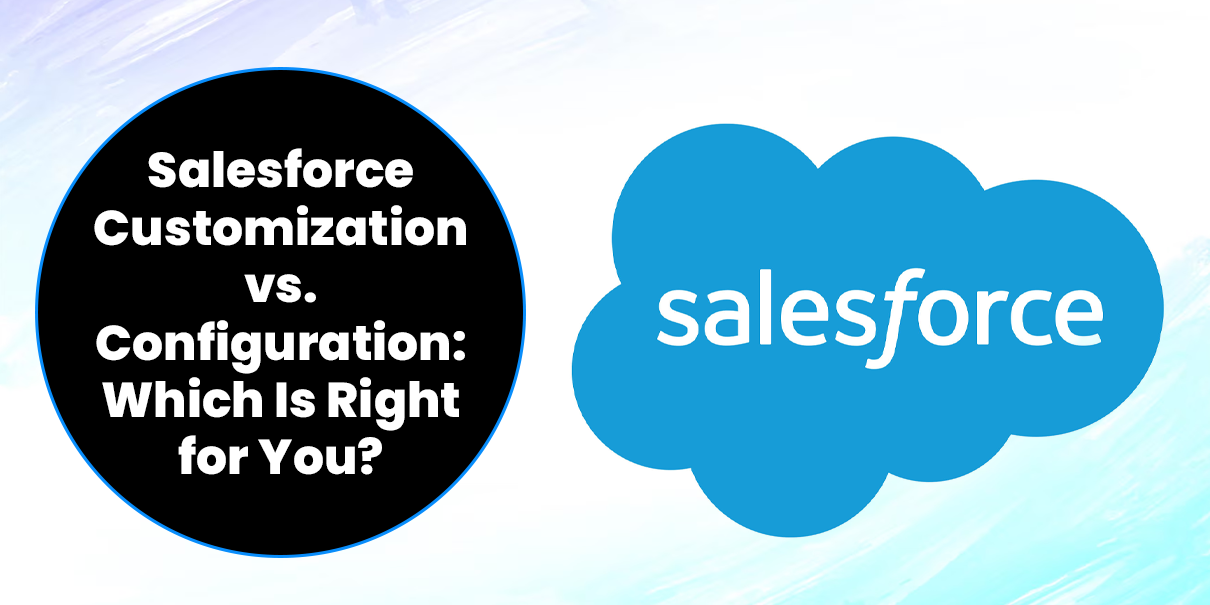Many businesses use Salesforce to organize their operations and optimize sales, but this out-of-the-box platform may not meet all of their clients’ particular needs. Salesforce is one of the most popular CRM/ERP tools on the market, due in significant part to the many customization and configuration options offered to better tailor it to individual business needs.
Different brands have varying levels of complexity that simply can’t be addressed by a one-size-fits-all software tool. Therefore, the system will require either configuration or customization. The question of Salesforce configuration vs. customization is more than just a parsing of words; it is an integral decision that can yield genuine business value.
To help organizations determine what they need, this comprehensive guide will cover:
- What Salesforce customization is.
- What Salesforce configuration is.
- How to determine which one suits your needs.
- The best deployment strategy for each.
What Is Salesforce Customization?

Informed by the many clients they’ve helped, such experts can ensure that implementing Salesforce will actually help meet your business goals and do so in the most cost-effective way.
Salesforce Customization Options
| Option | Details |
|---|---|
| Built-in Feature Improvements | Leveraging Salesforce programming experts enables companies to extend built-in features and apps to meet more complex needs. Programmers can look under the proverbial hood of different features and apps to change parameters and simple functions that make them better suited to a given business use case. |
| Integrations | If the included features do notdeliver sufficient results, Salesforce experts are well-versed in integrating the platform with third-party applications to improve functionality with APIs and provide features that aren’t available OOTB. |
| Custom Apps | The best Salesforce customization partners can create custom apps that are purpose-built for your business’s use, which gives you the most highly customized Salesforce experience possible. |
| UI Customization | Regardless of how you extend Salesforce features, expert programmers can transform the user interface to ensure that it’s as easy as possible for your staff to use, no matter their level of Salesforce experience. |
Customization is the best choice for firms that will require a heavier lift to get Salesforce to fit their specific workflows. Consider this option if a standard Salesforce implementation only provides between 80-90% of the features outlined in your company’s business requirements document (BRD). For more details on creating a BRD, check out our out-of-the-box vs custom development software guide.
It is also a given if you do decide you need to do a full Salesforce customization project, you will still be doing Salesforce configuration as well to align the system with your business needs. Let’s look now at that process.
What Is Salesforce Configuration?

Configuration is for simpler modifications, including:
- Altering user permissions to determine which employees see certain information.
- Creating reports and customizing dashboards to present your most valuable data in clear, readable formats for decision-makers.
- Configuring security settings to reinforce data security and maintain compliance with relevant regulations.
- Creating custom workflows to improve efficiency and clarify employee responsibilities.
Although this is by no means is a comprehensive list of possible native configurations for particular business needs, it highlights some of the most common applications. It also suggests a scale for the problems you might solve through configuration alone.
While still limited in scope, ensuring you have a team member who’s an expert in configuring Salesforce and can optimize your CRM/ERP operations will save valuable staff time and energy.
Salesforce Customization vs. Configuration: Which Do You Need?
If Salesforce offers 90% or more of the features you need, you may not need to invest in any custom software programming at all. Using available configuration tools may be enough to meet your needs with an OOTB platform. While this approach can save you a lot of money, it may only close small gaps in functionality.
If Salesforce only provides 80-90% of the features you need, then it’s possible to devise a workable solution with third-party or custom apps and experts who understand how to integrate them seamlessly.
If Salesforce falls below the 80% mark for essential features, however, you may be best served by considering custom software development, as it’s typically the most valuable and cost-effective option over time. This is because adding enough custom functionality to bridge such a large gap can cost nearly as much as fully custom software. Companies must still pay for Salesforce software licenses in perpetuity, however, minus the value of your own software IP.
The Best Salesforce CRM/ERP Deployment Strategy
For firms simply looking for Salesforce configuration, having a single Salesforce expert on staff is usually sufficient. Screening for this is a great idea when hiring IT staff, as they are the frontline in maintaining the hardware and software your company relies upon.
But if your company has more complex needs that Salesforce struggles to meet, hiring a custom software developer for Salesforce customization is your best option. Partners who are only familiar with Salesforce and related apps won’t necessarily be able to create new custom apps or integrations to ensure clients get the most custom-fitted experience with the platform.
This limitation leaves businesses vulnerable to overpaying for a product that will ultimately underperform. Custom software developers can bridge gaps with their special brand of expertise and creativity both within and outside the Salesforce platform that others simply can’t.
This is especially true for firms when Salesforce doesn’t cover 80% of necessary functionality. Partnering with a custom software developer means you can change course if necessary and acquire a 100% custom CRM/ERP platform developed solely for your business.
This option delivers all the functionality you could possibly need, and you’ll never have to pay a licensing fee. Your company will own the platform it uses, and the IP will contribute to the value of your company. Salesforce-only customization partners are incentivized to keep companies reliant on Salesforce even if it’s not the best option. Custom software devs with multiple OOTB software certifications can offer help for any option that works for your company.
Salesforce Customization With 7T
At 7T, we use a “Business First, Technology Follows” approach to create genAI solutions for our clients across countless industries. Our custom-built platforms leverage machine learning and AI technology to deliver significant operational advantages with a robust ROI. Our team will audit your organization’s challenges, often showing up on-location to embed ourselves in your business for a time to understand your needs from a first-person perspective. Then, we’ll architect a value-generating solution to transform your vital processes and meet your goals.
7T is based in Dallas, Houston, and Charlotte, NC, but our clientele spans the globe. If you’re ready to learn more about Salesforce customization vs configuration, contact 7T today.








